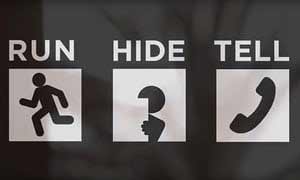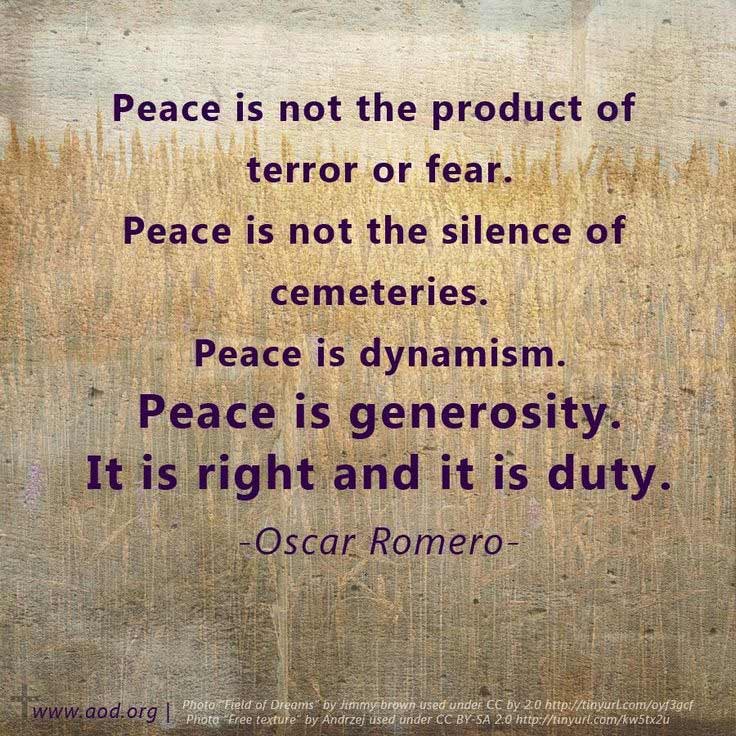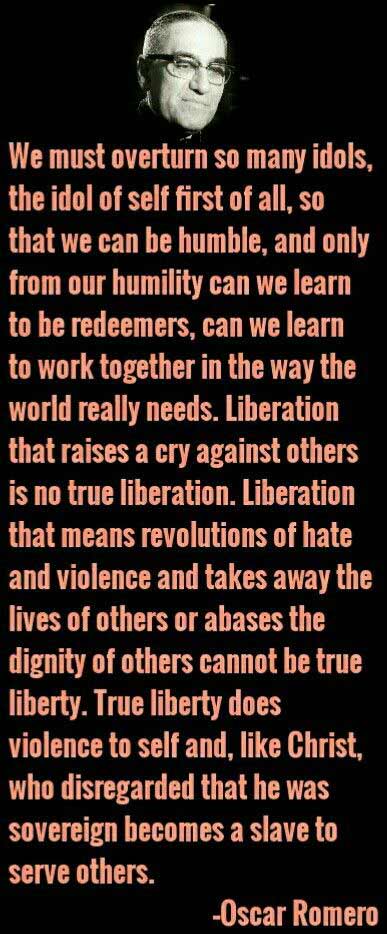Some people have reluctance to continue in fostering the peace movement. It is easy to want to walk or run away. It is also easy to get discouraged or outright hopeless.
Ironically, the first day that I joined the peace moment was the same one that I most desperately wanted to run away. I literally, wanted to flee with every part of my being, but somehow managed to sit still instead.

At the time, I was five years old. I was sitting on a bench at a Quaker (Religious Society of Friends) Meeting. I remember the drop-dead silence surrounding the deeply inward-dwelling people all around me. I remember the contrast that the occasional trilling bird in the shrubbery outside the window made and the merry splash of intermittent sunshine on the floor opposed to the overall dimness of the room. Then I heard the room’s door open followed by a muted shuffle of feet.
Curious, I glanced upward and saw a struggling parade of frail outlines shaped like humans — faltering spectral forms wrapped in gauze from head to toe like mummies in a B-grade horror flick. Meanwhile each person in the group slowly and tortuously drew ahead on unsteady feet — a movement forward so difficult to execute that one could palpably feel the duress and had to resist the impulse to grab hold of the ones with the worst gait so as to steady and help. Indeed, it appeared as if a tremendous and excruciating effort was required for each footfall to follow the next one.
One, also, had to resist a contrary impulse. That one was simply to avoid the alarming sight altogether. Accordingly, I simultaneously felt like jumping to my feet to assist the bunch and moving past them right out the door. Their struggle was that stark and striking to behold.
Instead of either choice, I simply gripped my father’s hand and began to wonder about whatever these people could have done to deserve such a horrific fate. What could any person ever have done so terribly wrong to receive such utter damage done unto them in return?
(I’d been told in advance of attending Meeting that a group of women, ones called Hiroshima Maidens from a far away land, would be joining us as Friendly families were hosting them while they received medical aid at a local hospital for grave damages caused by a bomb released during a war. Yet, what did I know of bombs and wars at age five? All I knew was that these women looked plainly dreadful — far more dreadful than any fanciful nightmare that my young mind could dredge up during sleep. I, likewise, knew that they didn’t seem as if they, or anyone else for that matter, could ever have done anything so awful so as to to deserve the ravage that they, so pitifully, expressed. In short, they were heart wrenching in the extreme.)
Although my childhood was fairly normal in most respects, I never did get over the searing image that these drastically broken women created in mind. At the same time, I’d fairly quickly figured out that, if something such as happened to them (seemingly innocent people) could occur once, then it could hypothetically take place again and to everyone who I loved, including myself. This afterthought did greatly alarm.
So, you can imagine my pronounced glee when my third grade class had its first mock air raid drill. Oh, it was such a thoroughly happy moment when I crouched under my desk in a ball while covering the back of my neck and lower head with my hands. How exciting! (What pathos underlies the thrill.)
That day, I could hardly wait for the school bus to bring me home. I flew from its steps and down the street. I raced into the house while breathlessly yelling for my mother to come watch me. Then I got under the dining table while commanding something like, “See? See? This is all we need to do. Do it like this. Now we can all be safe. Tell everyone who you know.You must RIGHT AWAY!” Then I explained about the manner in which this hiding under tables in a specific pose could save us all from bombs, the type of bombs that hurt those poor mangled Maidens!
In response, my mother gently drew me up into her lap and asked me whether I truly thought that a flimsy wooden cover could sufficiently protect anyone from the severe type of breakage that bombs can render. With such a revelatory question, all my hopes were dashed in an instant.
Shocked, I, quietly, asked about what could work instead to which my mother replied that one action and one action only could help. And this is to work for peace, and to spread the word about its value while resisting, at all costs, any activities that promote contrary aims. We, then, discussed the various ways that people can bring about this outcome — the peaceful alternatives to violence.
Of course, her comments were delivered many wars ago. Since then, I have watched many people come back from their peace efforts renewed, refreshed and enlivened. These have included our family dentist, who periodically would close his practice to Freedom Ride; family members and friends who proudly strolled in the first protest march against the Vietnam war; US citizens, who hid pacifist Cambodian students during the Vietnam War so that their mandatory inscription for which execution was the alternative could be avoided, and many others, who acted with unrelenting courage of conviction.
Simultaneously, I have watched grave harm occur to people deliberately choosing to buck the status quo. My being spit on by racists while collecting Green Stamps to paste into books that I donated to a group that could exchange them for cheap bus rides from the Northeast to Selma during the Civil Rights contention is nothing compared to War Tax resisters being jailed and losing their homes… is nothing compared to someone being under permanent house arrest for peace activism… is nothing compared to being brutally beaten and shot at during protests… is nothing compared to being muzzled after spending years in solitary confinement (Vanunu)… is nothing compared to losing your life in sadistic torture (captured resistance operatives in WW ll, slain Civil Rights workers and countless others going as far back as human history).
Yet conscience and ethos often compel one forward such that no other course of action than the one taken is possible regardless of personal outcome for oneself. Of course, many activists know that the outcome from their activism is uncertain and could lead even to death. Yet they undertake the action, anyway. How courageous!

So I particularly admire people like Archbishop Romero, who when he was out in public, was always encircled by a brave group of people willing to take a bullet meant for him by those in power in his country. (In the end, they killed him, anyway.) I revere him and them — his protectors!
Yet Romero is correct. “It is a right and a duty.” It is not fun nor exciting, as some of my friends can attest, to use your own body as a human shield so as to possibly take a bullet. It is not alluring to have machine guns casually pointed at you by smirking guards as happened to a Jewish family member of mine, who was asked to, at no financial recompense, inspect refugee camps in Laos. It is no thrill to be someone Freedom Riding while knowing that one could get killed by doing so as happened to my childhood friend, Andrew Goodman. All the same, “it is a right and a duty.” So one goes forward, anyway.
If needed, I’d put my own body forward to protect Romero’s and I’m no Catholic by any stretch of the imagination. Likewise, I’d do it for anyone needing that assistance if (s)he is trying to serve life’s betterment, and I do not care whatever religion that (s)he follows, nor the culture of origin.

There is a gritty surety in one’s direction no matter the degree that the task ahead is daunting, scary, risky and seemingly impossible. Regardless of anticipated results, the choice is totally clear and the sides are definitively drawn! One, thus, deeply knows and lives these words by Oscar Romero:

https://en.wikipedia.org/wiki/Romero_(film)
Romero is a 1989 American biopic depicting the story of Salvadoran Archbishop Óscar Romero, who organized peaceful protests against the violent military …
You, also, know that wars are very difficult to dismantle. As Scott Schaeffer-Duffy, a pacifist Catholic Worker who has laid his life on the line, once explained to me — the violence is like pressurized magma just waiting to erupt. Once you tamp it down in one place on the planet, it will rise up on another spot. There seems no end to it, which is all the more reason to put one’s full force of being against violence.
Yes, there seems no end to it. If it’s not happening in Iraq, it is in Afghanistan and Syria. If it is not in these hot spots, it is in South Sudan, Myanmar, and countless other locations where the seething threat is barely below the surface. Then, too, there are all the less visible, although equally brutal, wars that are taking place along side of these more graphically pronounced ones.
For example, there are the wars against the poverty stricken and other maligned, marginalized masses — wars in which they are used for cheap expendable labor by the managers of transnational companies whose parasitic owners and stock holders are reaping billions upon billions of dollars while not paying living wages to their employees (~ eleven cents an hour to Caribbean laborers who make Disney products, ~ $1.50 a day as a WalMart garment worker’s salary in Nicaragua, ~ eight cents a pound for Starbucks coffee growers, etc.).
At the same time, the ignorance of people, who see oppressive clashing forces as a simple case of us (the good guys) against them (desperate migrants or stereotyped sub-human terrorists) is certainly myopic. In short, they fail to see that many of the migrants want to patriotically support new countries in whatever ways that they can while some of the terrorists deeply revere 1700’s American Revolutionaries, a ragtag motley collection of individuals just as grimly determined to protect their lands from overseas invaders as are they, themselves, are currently trying to do.
Meanwhile, many of the gung-ho flag waving patriots, whose troops aggress, ponder on the reason that it takes so long to quell and render subservient those who resist their countries being plundered. That is, they do if they bother to think about anything else much beyond the upcoming shopping spree at the nearest mega-mall, the choices in upcoming TV sitcoms, the relative merits of various anti-wrinkle creams, the lineup for professional sports teams, one’s own latest golf score, etc.
When considering the sheer magnitude of it all, one easily can get discouraged. Accordingly, I imagine that most of the others with the same goals as my peace-nic friends do and sometimes when I, personally, do — I recall this ensuing account. (It helps me regain my strength of purpose when everything starts looking too bleak for me to carry on.)
It is one shared with me by my parents, who knew the featured, young American during the 1940’s. As an aside, he was nineteen years old at the time of his return to the US…
After having lived at Gandhi’s ashram and shortly before his departure back to the US, a young man requested an exit interview with Gandhi (who brought his Hindi interpreter along). Upon meeting for this final time, the eager young man asked, “How can I ensure that your message of peace and universal brotherhood can be made a successful realization in America? What can I do to make certain that this WILL happen?”
In response, Gandhi shakily rose to leave and answered the query in Hindi (despite that he could speak in perfect King’s Standard English as he had been trained as a lawyer in Great Britain). Meanwhile, the interpreter translated into English, “Interview is ended.”
The young man pleaded, “But why? What is wrong? I do not understand.”
Gandhi, turning back from leaving the room, replied, “It is because we are not speaking the same language. You see, you speak of success and think of failure. Your vision and your words are wrong… Instead, you must think of yourself and all of us as birth attendants upon the world. We will and must try to do our utmost to bring about a good delivery as it is our responsibility. However, we, absolutely, cannot think in terms of success and failure. We simply must do all we can in the best way that we know to help the world irrespective of any presumed outcome. Our effort, in and by itself, must be our whole focus.”
In a similar vein, we know where personally isolating ourselves from personal and global difficulties, while doing nothing to try to address them, leads. We, also, know where indulging in various forms of self-advancement, at the exclusion of others, does. What we do not know, though, is how intentional changes in some life choices can make a difference. Nonetheless, we have to try out these alternatives. After all, it is the only viable way to proceed toward our world’s future!
Sometimes, I wonder what Gandhi might think if he were to see the world as it is today. Would he be gloomy?
At times, it staggers the imagination to consider the depths of depravity into which people, individually and collectively, can sink in a self-serving, greedy desires to control, destroy and/or own all. At the same time, it greatly amazes that this orientation can exist along side of unrestrained expressions of extreme self-sacrifice, unbreakable compassion even in the most dire circumstances and extraordinary outpourings of tenderly rendered care. How contradictory the two directions are!
In the end, it is up to each and every one of us to decide the type of world that we want to help create. What version of the future do we want?
I do know the vision that the Romero supporters and a number of my kin, who lay their lives on the line, hold. I likewise know the outlooks of my friends who do the same action of willing self-sacrifice. I also know that we need the hopeful vision that their determination creates. It helps makes life worthwhile and serves to propel me onward.
So I am thankful for their relentless drive and for the time that they dedicate to improving our collective condition. Both have brought us a world of goodness. In the end, this goodness can never be destroyed.
Sally Dugman is a writer from MA, USA.











































